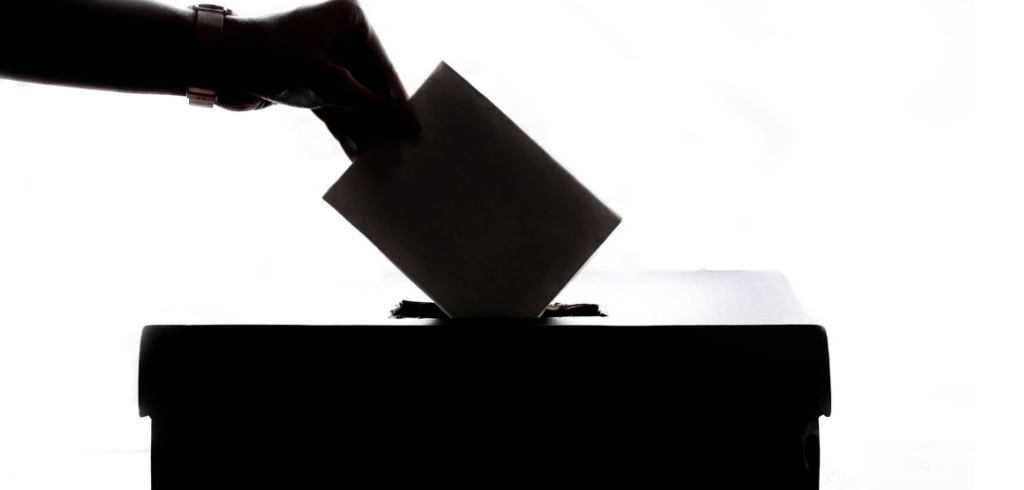Following an event-filled Student Week Against Mass Incarceration that examined the relationship between mass incarceration and the current housing crisis this year, the Fordham Law Advocates for Voter Rights (FLAVR) student organization hosted a virtual panel discussion focusing on decarceration, democracy, and voter restoration. A cohort of experts and advocates addressed the consequences that stem from mass incarceration as well as ways in which the deprivation of voting rights feeds into the underlying issue.
The event was held on March 10 in partnership with National Lawyers Guild, People’s Parity Project, and other Fordham Law institutes and organizations—including the Center on Race, Law and Justice; Feerick Center for Social Justice; Public Interest Resource Center; Stein Scholars Program; Asian Pacific American Law Students Association; Black Law Students Association; Latin American Law Students Association; Advocates for the Incarcerated; and Fordham Law Defenders.
 “The idea for this panel originated in conversations that we’ve been having within our Fordham community about things like voting rights and barriers that incarcerated folks face when reentering the community, and what we can be doing as law students, as future lawyers, and as members of our community [to change that],” said FLAVR 3L Advisor Joanna Barrett ’22 during her opening remarks.
“The idea for this panel originated in conversations that we’ve been having within our Fordham community about things like voting rights and barriers that incarcerated folks face when reentering the community, and what we can be doing as law students, as future lawyers, and as members of our community [to change that],” said FLAVR 3L Advisor Joanna Barrett ’22 during her opening remarks.
“This is yet another pivotal moment in our field, in criminal justice reform, where the goal posts seem to continuously move,” said Max Kenner, executive director of Bard Prison Initiative, who moderated the discussion. “This is a field that was the least likely to succeed not that long ago, and that has evolved into the singular issue with bipartisan success at the state and federal level, but so far to go in terms of making this country—at the local, state, and federal levels—a less racist, more just, and fair society.”
The panelists explained how they each have engaged with their communities and the prison system to provide opportunities for individuals and families who have been impacted by mass incarceration.
Alelur “Alex” Duran, program director overseeing Galaxy Gives’ criminal justice reform portfolio, explained how the world of philanthropy can sometimes be a “very lonely place.”
“Philanthropy is an institution that has been predominantly white and Ivy League and traditionally hasn’t had folks like me in leadership positions,” said Duran, noting that he was impacted by the criminal legal system at a young age and served 12 years in prison. “Folks on the ground expect me to do the job of putting as much pressure as possible to get things over the finish line.”
Bianca Tylek, founder and executive director of Worth Rises, a national criminal justice organization working to dismantle the prison industry, emphasized the importance of educating all people about issues within the criminal legal system and the realities of the prison industry and mass incarceration, so that they may advocate for themselves and others in similar positions.
“When there is a hearing on a bill or a piece of legislation that affects them, people can show up and either support it or oppose it,” Tylek said. “In this case, when it comes to incarcerated people, they don’t really have that opportunity to be heard on legislation and law policies that affect them.”
Worth Rises, as Tylek explained, has found creative ways to address this issue and bring incarcerated people’s voices into the room—including setting up phone hotlines that record testimonies ahead of a hearing and playing the testimonies during hearings or transcribing those testimonies and having volunteers step in to read them on behalf of the incarcerated.
Dyjuan Tatro, senior government affairs officer for Bard Prison Initiative, argued that society should be doing more to bring incarcerated people back into the fold of society. “And part of that is by restoring voting rights [to them],” Tatro said.
“I think that we’re at a moment in this country around redistricting and voting rights that, if we’re not on the side of voting rights for all, we’re agreeing to de facto exclusions,” he said. “If it’s ok to strip the voting rights from this or that person because they committed this or that crime, where does that end? And I think that leads us down a slippery slope to voter suppression laws.”
Students can email FLAVR at [email protected] for more information, resources, and updates about future events.

